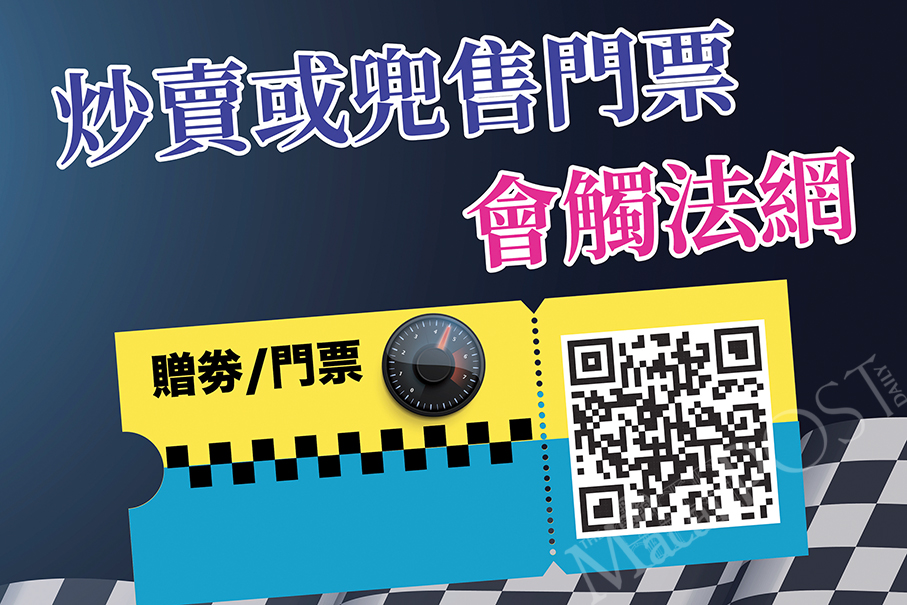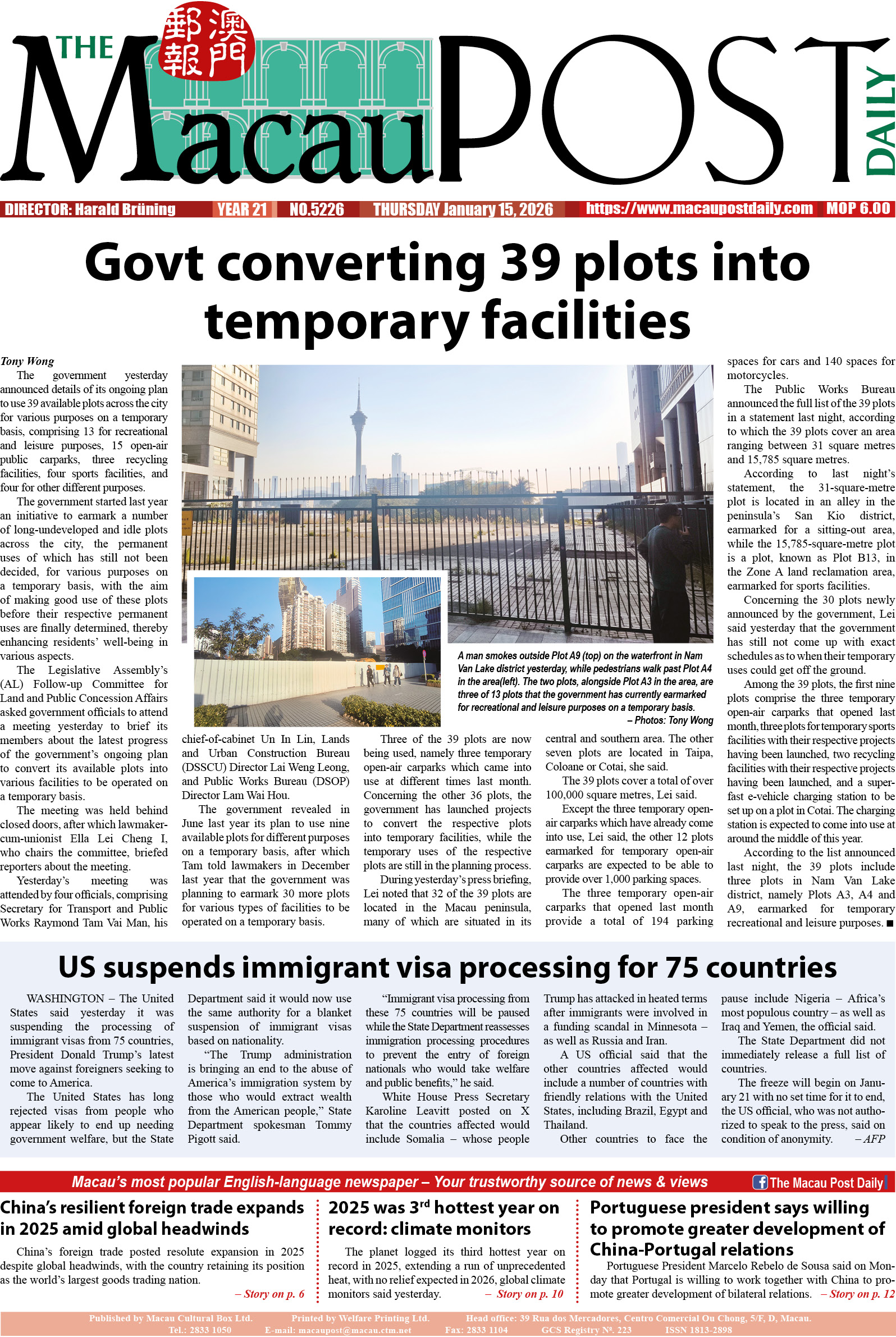A female mainlander rushing to Zhuhai airport attempted to cross the Barrier Gate border checkpoint on Tuesday with the Macau Health Code of another person which had been tampered with by a gang so that it displayed her personal information, as the validity of her own negative nucleic acid test (NAT) result had expired, Judiciary Police (PJ) spokesman Leng Kam Lon announced during a regular press conference yesterday.
The woman had obtained the forged Macau Health Code from a local man, who is a member of a mainland gang which targeted Macau-Guangdong travellers who could not cross the Macau-Zhuhai border due to their negative NAT result having expired, and “sold” them forged Macau and Guangdong Health Codes, according to Leng.
Both have been arrested by Judiciary Police.
According to Leng, the woman chose not to undergo a new nucleic acid test and instead to “buy” the forged health code from the man as she needed to rush to the Zhuhai airport to catch a flight.
Leng identified the woman as a 33-year-old surnamed Cao who told the police that she is a businesswoman, and the man as a 49-year-old surnamed Fu who told the police that he is unemployed.
On Tuesday afternoon, according to Leng, Fu approached Cao outside the Barrier Gate border checkpoint, as she was rushing to Zhuhai to catch a flight at the airport there. Fu told Cao that he could provide her with an “express car transport service” to the airport. Cao agreed to take hire the car service provided by Fu, Leng said, adding that consequently they crossed the Barrier Gate checkpoint together.
In the Barrier Gate checkpoint’s departure hall, Cao presented her paper NAT certificate to a security guard. However, the seven-day validity of her negative NAT result had already expired as she underwent a nucleic acid test on Sunday last week, Leng said, adding that consequently the security guard told her to undergo a new nucleic acid test before crossing the Macau-Zhuhai border. Cao and Fu left the scene together.
Half an hour later, the duo returned to the Barrier Gate’s departure hall, when Cao showed the security guard a screenshot of a Macau Health Code indicating a negative NAT result on her smartphone, Leng said.
Those travelling between Macau and Guangdong have to present a NAT certificate confirming that they have tested negative for COVID-19 within the past seven days. Those travelling between the two regions can switch their NAT certificate between the Macau Health Code and Guangdong Health Code systems. While they have to present their Macau Health Code when crossing the Macau-side of the Macau-Zhuhai border, they have to present their Guangdong Health Code when crossing the Zhuhai-side.
Having become suspicious of the situation, the security guard told Cao to go to the Health Bureau’s (SSM) COVID-19 counter in the departure hall. After scanning the Macau Health Code screenshot on Cao’s smartphone, Leng said, the health officials discovered that the health code’s personal information (i.e. the personal information stored in the system’s health code), such as name and ID card number, was not Cao’s. Consequently, the health officials assumed that Cao had shown them a forged health code and reported the case to the Judiciary Police.
800-pataca “service fee”
According to Leng, PJ officers took Cao and Fu in for questioning. Cao admitted that she had paid Fu 800 patacas so that she could get a Macau Health Code and a Guangdong Health Code, which both belonged to another person, indicating a negative NAT result. Soon after Cao had paid Fu the 800 patacas, she received the Macau Health Code screenshot and Guangdong Health Code screenshot on her smartphone – which both had been modified and were displaying Cao’s personal information, according to Leng, who said that Cao then attempted to cross the Barrier Gate checkpoint with the Macau Health Code screenshot.
According to Leng, Fu admitted that he’s a member of a mainland gang providing forged Macau Health Codes and Guangdong Health Codes for travellers whose negative NAT result had already expired.
Fu told PJ officers that his function in the gang was to look for Macau-Guangdong travellers who could not cross the Macau-Zhuhai border due to their negative NAT result having expired. After he had reached a deal with a traveller, the gang members in the mainland then generated forged Macau and Guangdong Health Codes and sent them to the traveller, according to Leng.
In each deal, the 800-pataca charge was split into 200 patacas for Fu and 600 patacas for his fellow gang members.
According to Leng, PJ officers believe that the gang had illegally obtained the Macau Health Code and Guangdong Health Code with a negative NAT result which had been issued for a number of non-resident workers commuting between Macau and Zhuhai. The gang’s modus operandi was that they replaced the non-resident workers’ personal information with their clients’ personal information, which was displayed with the health codes on the screenshots, according to Leng.
According to Leng, PJ officers were still investigating how long the gang had been operating, how many clients it had provided the service for, and how much money it had earnt.
The duo have been transferred to the Public Prosecution Office (MP) for further questioning, both facing computer forgery charges.
SSM statement
Meanwhile, the Health Bureau (SSM) confirmed the case in a statement yesterday evening. The statement said that after scanning the Macau Health Code presented by the female visitor, health officials at the Barrier Gate checkpoint discovered that the code’s personal information was not hers, and consequently assumed that she had used a forged health code and immediately reported the case to the police.
The SSM statement pointed out that if travellers choose to use e-channels for their departure and arrival formalities at local Macau-Zhuhai checkpoints, the e-channel system also automatically verifies their Macau Health Code – confirming whether they are holding a green Macau Health Code and a valid NAT certificate. If travellers choose to use conventional immigration counters, they are required to go to the bureau’s COVID-19 counter where health officials will scan their Macau Health Code so that they can verify whether the travellers are displaying a genuine health code.
The SSM statement warned that those using a forged Macau Health Code face criminal charges.

Flanked by a senior Judiciary Police (PJ) officer (right) and a Health Bureau (SSM) official (left), PJ spokesman Leng Kam Lon addresses yesterday’s regular press conference. Photo: Camy Tam







